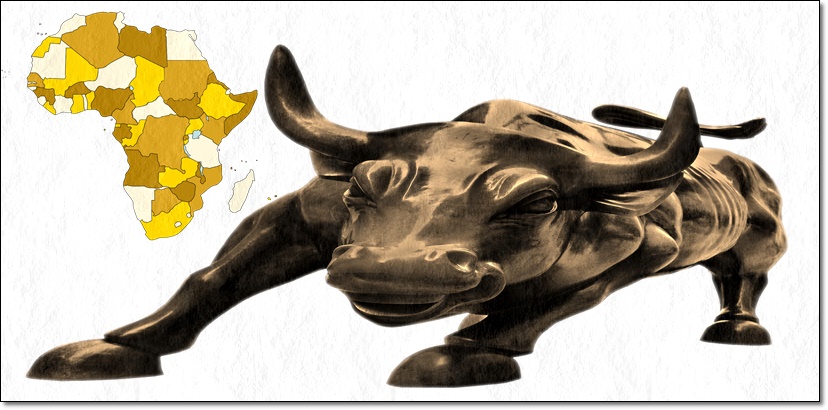Africa: The Coming New Global Economic Leader

In the next 50 years, Africa will be the new global economic leader. This will be, notably, the most sustainable economic paradigm shift the world has ever witnessed. This is not mere presumption or a dream, for global indicators are in every place.
The rise of Africa is poised to be a natural mutation for three reasons. First, the West and other transitory rich nations will have plateaued (technically, reached their highest summits) and will have no room for going any further but slowing down. Second, the faultiness in Western formations in terms of economic and political framing are growing more and more uncertain with each passing year. Third, social and ideological polarity in presently model democracies are but a sign of future trouble.
But juxtapose the above scenario with Africa. The past of Africa is its bridge to the future. Africa’s past means only one thing: Resilience. Africa has endured slave trade and colonialism – and has emerged forgiving, determined to re-write history and is focused on re-defining its future impact. Africans have been vilified as a race of people, de-nationalized as national states, censured as rational, intelligent beings, and overtly ruled out of technological competition. And yet, defying all odds, African nations remain relatively united, open, welcoming and integrated.
The anomaly has been that, in discussions dealing with Africa, Africa is “globalized” and not individualized. For example, Africa has 54 countries, and only 15 of these are in some sort of conflict: “There are currently fifteen African countries involved in war, or are experiencing post-war conflict and tension” (Africa Sun News – “Africa Wars & Conflicts”). This represents about 28%, and not 100% as international reports seem to suggest. According to the Institute for Economics and Peace, only Botswana, Chile, Costa Rica, Japan, Mauritius, Panama, Qatar, Switzerland, Uruguay and Vietnam can be considered truly free from conflict. In short, while more and more countries in America, Europe and Asia are tending towards conflict, Africa is more and more trending towards peace and unity. In economic parlance, peace and solidarity are catalysts for prosperity and economic investment. Africa will have both by 2070.
The most interesting African economic story will be told from Zambia. In terms of national character, Zambia has four factors that will catapult her to uncommon prosperity and economic growth. These are: The people are peaceful; the people are diligent and industrious; the people love knowledge and experimenting; and Zambians tend to be democratic in approaches to governance. Anyone who may argue against these four, either is peremptorily biased or have not studied Zambia the way I have done.
The above, notwithstanding, the necessary impetus for Zambian change is to have a mixture of true economic growth and prosperity while enhancing the happiness of the people based on what I call a “30-60-10 Upper-Income Economic Theory.” From a policy perspective, “30-60-10” means 60% of population is upper-class; 60% middle-class; and 10% lower-class. In this paradigm, middle-class will be defined as being able to enjoy an acceptable standard of living and being happy (happiness will mean having a life expectancy of 76 years and above; enjoying and having access to a stable and working social support system; freedom from corruption; being able to give to others; and ability to bring in an income that meets all the basic needs and have surplus for saving for the future). In short, the middle-class is an affluent class. The upper-class will be those who exceed the middle-class definition, and the lower-class are those who fall short of the middle-class definition.
The future of Zambia lies in the deliberate restoration and empowerment of the middle-class. In this Zambia, the middle-class will not be the engine of the economy; they will be the heart and soul of the economy. This economy will be designed to grow from bottom-up. Rebuilding the middle-class and maintaining it at around 60% is key. The rich or upper-class do not grow the economy unless they can create jobs. A large percentage of the lower-class means less productivity and more dependence on government handout. The goal will be to move a large chunk of the poor population into the middle-class (by deliberate government’s action that legislatively creates an enabling environment for fair competition).
The result of this economic paradigm is to reverse the historical inequalities created by the imposition of structural adjustments that work for Western cultures but totally fail in Africa. They have failed because:
(1) African ideology is neither socialism nor capitalism; it’s a combination of many factors, including welfare capitalism and a form of socialism that minimizes social proprietorship and maximizes a democratic control of the means of production. This balance is essential to reduce the gaping social and economic inequalities among the population;
(2) African leadership and democracy must be redefined; and
(3) African innovative spirit and free experimentation have been mischaracterized.
In future articles, I will elaborate on (2) and (3) above and will provide parameters for formulating policy as well as the embalming of a diligent and corrupt-free culture that ensures the paradigm’s success and survival.
By Charles Mwewa
charlesmwewa@gmail.com
